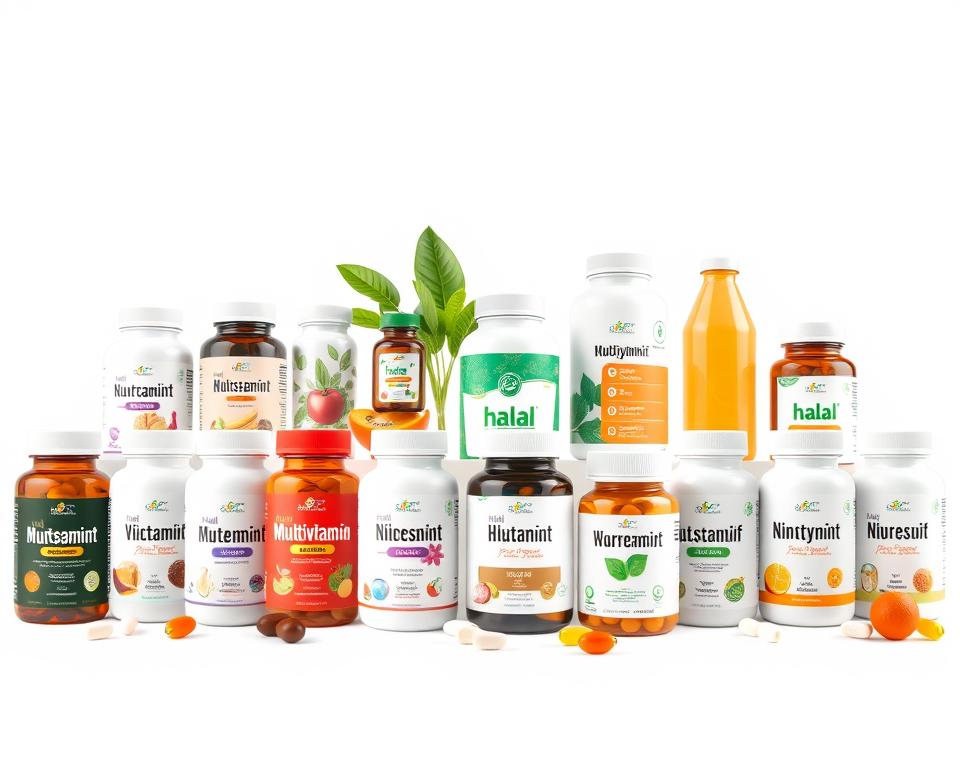Halal Multivitamin Supplements: What You Need to Know
Do you ever question if your vitamin intake reflects your ethical choices and nutritional demands? The search for halal multivitamin supplements is expanding, motivated by individuals wanting to follow Islamic dietary rules and keep healthy. The shift points to a wider embrace of halal nutrition, balancing well-being with adherence to personal values. In this article, we delve into halal health’s relevance and what distinguishes these halal multivitamin as leading picks.
Understanding Halal Supplements
These dietary supplements are created to meet Islamic dietary requirements. They are carefully checked to meet these standards, avoiding any ingredients from pork, alcohol, or non-halal animals. The surge in health consciousness has elevated interest in halal nutritional products. Today’s shoppers want detailed insights into manufacturing processes and product sourcing.
These supplements emphasize ethical production, setting halal supplements apart. Producers are obliged to ensure their offerings are devoid of any prohibited elements. This focus on purity not only improves the supplements’ nutritional value but also builds trust in halal-certified brands.

Why Choose Halal Multivitamin Supplements
Choosing high-quality halal multivitamins delivers crucial perks for people devoted to wellness and faith. They comply with Islamic dietary requirements and simultaneously enhance general well-being. They provide vital nutrients that boost energy and strengthen the immune system.
Expansion of the Muslim community has driven up the desire for products honoring spiritual and cultural principles. These supplements draw in individuals focused on ethical sourcing, aside from purely religious reasons. Since they lack prohibited ingredients, these vitamins are popular among vegetarians and wellness devotees.
Choosing products with halal certifications ensures they are made with honesty and openness. Such clarity instills trust in buyers, indicating they’ve chosen a reliable and health-focused product. Incorporating these supplements into your everyday life can uplift vitality and offer comfort.
Key Ingredients in Halal Multivitamin Supplements
These supplements strive to deliver crucial vitamins and minerals derived from permissible, safe origins. Their composition incorporates elements that promote wellness without violating halal standards. Major elements consist of:
- Vitamins sourced from lichen for Vitamin D, ensuring a plant-based alternative suitable for halal health.
- Beetroot-sourced iron, supplying a safe and halal-verified form of iron.
- Omega-3 sourced from algae oil, delivering an algal omega-3 supplement suitable for halal diets.
Consumers must verify that any animal-based components, like gelatin or whey protein, are from certified halal vitamins. This ensures these ingredients come from animals processed according to Islamic standards. Opting for halal vitamins supports dietary choices and promotes a holistic approach to health.
Haram Ingredients You Should Avoid
Investigating halal vitamins calls for careful attention to prohibited ingredients. They threaten the compliance of otherwise kosher holistic supplements. One must make sure chosen supplements conform to halal laws and personal convictions.
Often made from porcine sources, gelatin is a haram additive in various products. Additionally, alcohol as a solvent and enzymes derived from non-permissible animals pose concerns. Magnesium stearate or glycerin might be haram depending on their source origins. Opting for vegetarian or plant-based options eliminates these risks.
Identifying haram elements is key to adhering faithfully to halal supplement guidelines. With this awareness, consumers can choose truly halal supplements that support health without contravening faith.
Spotting Authentic Halal Vitamin Certification
When searching for certified halal vitamins, it’s important to examine the packaging closely. Find the halal emblem, signifying the product’s compliance with Islamic dietary regulations. That certification logo serves as a trusted sign of halal integrity.
Be sure to examine all listed ingredients carefully. Confirm that all animal components comply with halal processing regulations. Pay special attention to gelatin, as it could be non-halal if improperly sourced. Validating the halal nature of ingredients ensures you make the right selection.
Contacting companies directly often provides deeper insight. They can share comprehensive details about their halal review and approval procedures. It strengthens confidence that the product truly adheres to halal standards. Following these guidelines ensures your selected vitamins conform to halal eating rules.
Are Gummy Vitamins Halal? Exploring Options
Gummies are a favorite for families and fitness enthusiasts, turning vitamin intake into a pleasant experience. The catch is ensuring they’re halal, as traditional gummies use gelatin, which isn’t halal.
Now, some brands produce halal-certified gummy vitamins by substituting plant-based gelling agents. Such plant-based binders allow consumers to indulge in gummies while staying true to their dietary laws. Always verify the components and ensure a halal certification mark is present before purchasing gummy supplements.
Choosing the right halal supplements can boost your wellness while sticking to your dietary preferences.
| Brand | Type | Halal Compliance | Key Ingredients |
|---|---|---|---|
| SmartyPants | Gummy Multivitamins | Halal Certified | Pectin, Vitamin D, Omega-3 |
| NutraBlast | Gummy Immune Support | Halal Certified | Carrageenan, Vitamin C, Zinc |
| MaryRuth Organics | Gummy Probiotics | Halal Certified | Pectin, Probiotic Blend |
Halal Protein Powder: An Option for Active Lifestyles
Active individuals can benefit from adding halal-certified protein powders to their regimen. Derived from sources like whey, these powders are key for muscle recovery and growth. Always verify that no forbidden ingredients have found their way into the protein formula.
In reaction to market needs, numerous companies now supply halal-certified options with clear sourcing. This trend serves aware consumers by guaranteeing their protein choices comply with halal rules. Opting for halal protein powder not only respects dietary restrictions but also boosts overall health.
| Brand | Type of Protein | Certification |
|---|---|---|
| Optimum Nutrition | Whey Protein Isolate | Halal Certified |
| Orgain | Plant-Based Protein | Halal Certified |
| Muscle Milk | Protein Powder Blend | Halal Certified |
Including these powders in your diet helps you achieve fitness aims without deviating from halal observance.
Halal Vitamins That Enhance Immunity
Halal multivitamins are vital during flu seasons or global health crises. These formulations typically include vitamins A, C, D3, and zinc. These nutrients are key for a strong immune system, all while following halal dietary rules. Consumers can choose from various recommended halal options focused on immunity.
The market continues to expand with more halal-certified supplement choices. These offerings are formulated to boost health in line with halal principles. They deliver critical vitamins and minerals to fortify immune defenses. Integrating halal multivitamins into daily life facilitates better health aligned with your faith.
Wrapping It Up
Halal-certified supplements are now central to many health-focused markets. They appeal to those who value nutrition and adhere to dietary beliefs. Growth in halal offerings enables health-seeking consumers to remain faithful to their values. These trends set the stage for a healthier lifestyle that doesn’t conflict with halal principles.
Knowing how certification works and reading labels carefully is crucial. It helps individuals make informed choices about their halal dietary supplements. Such diligence not only enhances well-being but also upholds spiritual devotion.
The expanding halal sector gives an opportunity to harmonize ethics with personal wellness. Purchasing halal multivitamins cultivates a wellness plan aligned with ethical standards. It respects personal beliefs and lifestyle choices.

